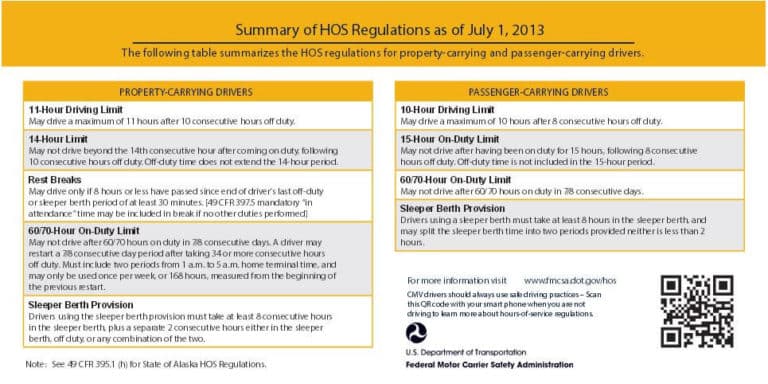Michigan DOT Hours of Service Rules & Regulations Guide For Truck Drivers

Michigan DOT hours of service rules and regulations for and how truck driver fatigue contributes to crashes
Below are the Michigan DOT hours of service rules and regulations for property-carrying and passenger-carrying CMV drivers.
What are the Michigan DOT hours of service rules and regulations for property-carrying commercial motor vehicle (CMV) drivers?
- 11-hour driving limit: May drive a maximum of 11 hours after 10 consecutive hours off duty.
- 14-hour limit: May not drive beyond the 14th consecutive hour after coming on duty, following 10 consecutive hours off duty. Off-duty time does not extend the 14-hour period.
- 60/70-hour on-duty limit: May not drive after 60/70 hours on duty in 7/8 consecutive days. A driver may restart a 7/8 consecutive day period after taking 34 or more consecutive hours off duty.
- Sleeper berth provision: Drivers using the sleeper berth provision must take at least 8 consecutive hours in the sleeper berth, plus a separate 2 consecutive hours either in the sleeper berth, off duty, or any combination of the two.
What are the Michigan DOT hours of service rules and regulations for passenger-carrying CMV drivers?
- 10-hour driving limit: May drive a maximum of 10 hours after 8 consecutive hours off duty.
- 15-hour on-duty limit: May not drive after having been on duty for 15 hours, following 8 consecutive hours off duty. Off-duty time is not included in the 15-hour period.
- 60/70-hour on-duty limit: May not drive after 60/70 hours on duty in 7/8 consecutive days.
- Sleeper berth provision: Drivers using a sleeper berth must take at least 8 hours in the sleeper berth, and may split the sleeper-berth time into two periods provided neither is less than 2 hours.
What does on-duty time include?
On-duty time is defined as time the truck driver begins to work or is required to be ready to work until relieved from all work and responsibility for doing the work. On-duty time includes:
- All time at a loading or unloading facility, terminal or any public or private property waiting to be dispatched, unless the motor carrier has relieved him or her from duty;
- All time spent inspecting the truck equipment;
- All truck driving time;
- All time, other than truck driving time, spent in a commercial vehicle except time spent resting in the sleeper cab;
- All time while remaining in attendance, repairing or obtaining assistance;
- All time spent including travel time taking a drug and alcohol test;
- All time performing any work in the service or employment of a common or private motor carrier; or
- All time spent performing any compensated work for any non-motor carrier business.
Violations and Penalties of the Michigan DOT Hours of Service Rules and Regulations
- Truck drivers may be placed out-of-service (shut down) at roadside until the driver has accumulated enough off-duty time to be back in compliance.
- State enforcement officials may assess fines.
- Federal Motor Carrier Safety Administration may levy civil penalties on the driver or carrier, ranging from $550 to $11,000 per violation depending on severity.
- Motor carrier’s safety rating can be down-graded for a pattern of violations.
- Federal criminal penalties can be brought against truck driver employers who knowingly and willfully allow or require hours-of-service violations.
Truck driver fatigue and the Michigan DOT hours of service rules and regulations
Truck driver fatigue contributes to countless serious truck accidents each year.
In Michigan, many truckers are driving fatigued, continuing to ignore the DOT hours of service rules and regulations, due to intense pressure by irresponsible company management to deliver loads on time, and ill-advised financial incentives.
Our truck accident lawyers can prove negligence when truck driver fatigue has contributed to a truck accident.
Injured in at truck accident? Call Michigan Auto Law now!
If you were injured in a truck accident in Michigan and need attorney to investigate the truck logs to see if the DOT hours of services rules were neglected, call now (855) 781-7747 for a free consultation with one of our experienced truck accident lawyers. There is no cost or obligation. You can also visit our contact page or use the chat feature on our website.
Michigan Auto Law is Michigan’s largest and most successful law firm that specializes exclusively in helping people who have been injured in auto accidents.
Our secret? Our attorneys deliberately handle fewer cases than other personal injury law firms. This allows us to focus more time and attention on our cases.
Unlike other law firms, our auto accident attorneys are never too busy to promptly return phone calls and answer questions.
We have more than 2,000 5-Star Reviews that reflect this care and attention to detail.
More importantly, this client-focused approach leads to better and faster settlements for our clients. Michigan Auto Law has recovered more million-dollar settlements and trial verdicts for motor vehicle accidents than any other lawyer or law firm in Michigan. We’ve also recovered the highest ever reported car accident and truck accident settlement in the state.
Call now so we can start making a real difference for you.





